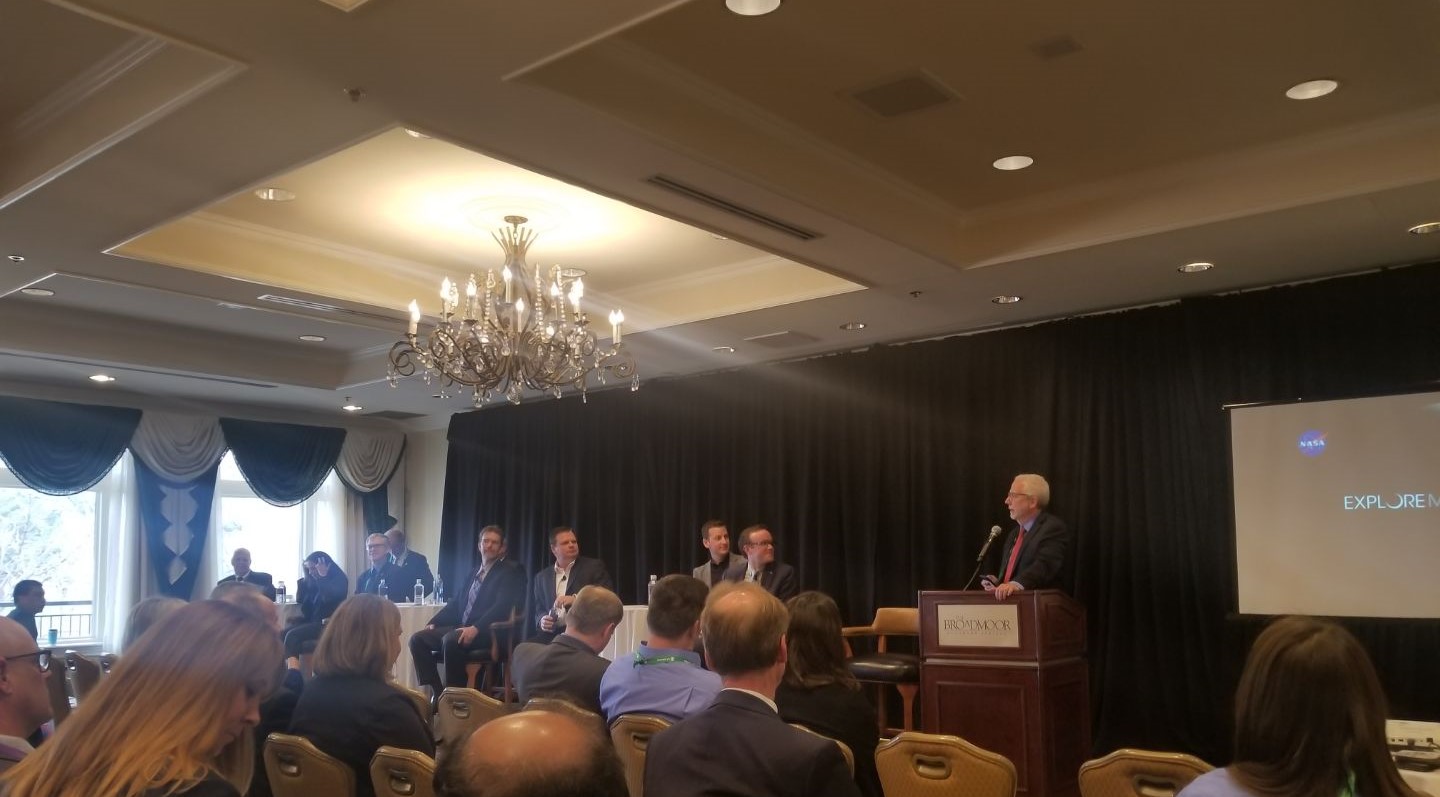Time to dive into the topics of the 35th Annual Space Symposium! I got a lot of really good insight from really knowledgeable people. There is so much to talk about, but I think we should kick it off with the Moons to Mars panel I went to on Day 3.
This panel was made up quite a few big names in the space community (see end of story for list of names) and mostly revolved around Vice President Pence’s announcement to have U.S. boots on the moon by 2024. Overall, the vibe I got was that this statement didn’t come as a huge surprise to anyone and they only really have to focus on decreasing their respective timelines for projects by about two to four years. Although “only” is a very loose term when dealing with space. That is still a lot of work to be done. This is still going to take some major engineering, but all of this has been in the works for quite some time. We have the plans and the technology; we just need to execute.
"Policies are slowing us down."
Which brings me to one of the major themes of this talk. Policies are slowing us down. One of the main issues the government and big companies face is the long list of regulations, procedures, testing, checking and re-checking, sign off after sign off… I am sure it gets exhausting. And it is so time consuming, I would believe it is the number one reason we would miss the 2024 deadline.
All these wonderful panelists basically said teamwork makes the dream work. (Which has been my motto for a long time.) Essentially, the game plan is to out source a lot of the work to commercialized companies. We can see this even on a large scale such as Lockheed Martin winning the contract for the Orion capsule (the place the astronauts will sit). On the next level deep, Lockheed has outsourced some of their work to smaller companies, such as the company I interned for. So we have tons of people working on just the capsule with many different ideas and specialties to make it work. It is especially important to note the international partners part of this too. One of the cool things about space is we can try to put aside our terrestrial problems for a common goal. ESA (European Space Agency) and JAXA (Japanese Aerospace Exploration Agency) are both really good examples of this through collaboration and sharing of findings. This kind of friendly partnerships is highly important to our success.
"NASA will be required to change its role."
Another topic was that NASA will be required to change its role. Not to hold all the blue prints and make all the parts and basically be the all-stars like they were for the Apollo missions. NASA will now be the authority figure and the ultimate go/no go voice of reason. That is why “integration” was one of the major buzz words throughout the discussion. NASA won’t spend its time building everything, but instead getting all the pieces back from their contractors and making sure they all work together. NASA will also be stepping up as the last check to ensure the design is safe for human flight. To this day, that is one of the most important authoritative powers NASA holds as a government agency: regulation for human flight. That being said, NASA will need to put its trust in the process and that their contractors will do the job correctly. Otherwise, we will get to the moon again, but we will all be skeletons sitting in a space ship by the time we get there.
Another important aspect that I didn’t consider as much is having a zero-gravity commercial economy! That means we are going to be getting big players like SpaceX, Lockheed, ULA, etc. to start having permanent and stable economies based outside of the earth’s atmosphere. I have a feeling this will be a long-term goal and we will probably have humans on the moon before it is a sustainable economy. But this does mean the leaders of the aerospace industry are thinking about it now and we might see the Low Earth Orbit industry picking up in the years leading up to our next lunar landing.
The other huge take away from the panel was how to get the general public invested. As I am sure you all could have guessed, my little ear perked up a bit at that. This is what I want to do! So what did the experts have to say about this?

"Show the public how space touches everyone."
There were a lot of expected answers such as “use social media” and “get the kids excited.” One unique answer I heard was “change the language we use” and that sparked something in me. They were mostly referring to the technical terms and crazy acronyms used to explain space. And while that is incredibly true (and something I am working on here), the effort should really be showing the public how space touches everyone. You don’t have to be a rocket scientist or an astronaut to understand space, get excited for it, or even make major contributions to our efforts through your own experiences. And I don’t think “get kids excited” is the right term, but more “let kids be excited.” Have you ever talked to a kid? They are already very excited. About everything. The key is to let kids be curious and get adults excited and asking why the sky is blue and why the moon is round. That is a key component to harnessing the excitement of the Apollo era.
Which leads me to the next key component, comparing right now to the Apollo era. My dream is to get the same hype that we had then. Many people don’t believe that can be done because circumstances are different. The Apollo support was during a unique time in history and that means it is highly unlikely we can rebuild that in modern day. To be clear, I want the same outcome and end product, but I am aware we need to take a very different approach (like social media). It was noted in the panel that we need to “recapture the spirit of Apollo with 2024,” but also be painfully aware how much work that spirit took to get. It wasn’t born over-night and it was part of political issues far bigger than we want to be involved in right now. The majority of the US probably doesn’t want another Cold War just to go to the moon. We have to be aware of the work needed to bring back that energy and we need to look at the differences of then and now. The biggest difference? NASA isn’t the only player anymore. We have more people working in the space industry, both government and private, which means space is directly affecting more people’s lives. So while this is hard because there isn’t just one entity to support, we also have a greater outreach which can be used to our advantage. It will be different than the 1960s but the outcome will be the same. Humans will set foot on the moon.
I also somehow got up the nerve to ask a question at the end of the panel. “One major concern I am aware of in the moon versus Mars debate is that we will get comfortable with the moon and it’ll be 40 years before we consider putting boots on Mars. This is based on what we have already done with the ISS (International Space Station). How can we combat that?” Everyone agreed that this is an issue and a possibility. But the biggest answer was to show this is just a piece of a larger picture. We are using the moon as a step between us and Mars. We need to keep having deadlines and setting goals (and making them incredibly public) to be held accountable for our Mars goals. It was a good answer and one that we should be talking about.
"We are going to the moon."
The number one take-away that was said multiple times throughout this panel is we need to treat Moon 2024 as a given. It is the most important thing I got out of the panel and that is why I want to discuss it last. It is hugely important to talk about attitude. Yes, there are a million things that could happen in the next five years and there is a very real change that budget won’t work out or testing fails or Earth gets struck by an asteroid. But the general public needs to understand that this is now a fact that we will base all planning on until that fact changes. This is now the reality we live in. So start getting excited! Start planning your viewing parties and stay update with how the rocket builds are going.
We are going to the moon in 2024. Hope you’re ready for it!

List of Panelist and Organizers:
- Ed Swallow, Senior Vice President, The Aerospace Corporation
- Marshall Smith, NASA Lunar Exploration, NASA Headquarters
- Mark Geyer, Director, NASA Johnson Spaceflight Center
- Dan Hendrickson, VP Business Development, Astrobotic
- Alan Campbell, Space Systems Program Manager, Draper Laboratories
- Steve Altemus, President & CEO, Intuitive Machines; VP Aerospace Services
- Tim Linn, Lockheed Advanced Programs, Lockheed Martin
- Alain Berinstain, VP Global Development, Moon Express
- Dr. Chris Culbert, NASA Chief Technologist, Johnson Space Center
- Dean Eppler, Chief Lunar Scientist, The Aerospace Corporation Dr.
- David Miller, Vice President and Chief Technology Officer, The Aerospace Corporation
- Chris Zavrel, Acquisition Lead, Stellar
- John McCullough, Exploration Integration and Science Director NASA Johnson Spaceflight Center
I honestly cannot wait for this! I was excited before, but now! This amazing. Hopefully we can get past all the hurdles and really get this going for 2024!!
You’re right, NASA definitely needs to leverage commercial partners more to speed the processes up. Any ideas how to maintain quality control though? There was a recent article about a company (Sapa Profiles) that scammed NASA at a cost of $700mm in failed missions
https://www.syfy.com/syfywire/nasa-700-million-failed-missions
Interesting point! I am surprised they are only being held accountable for $46 million. Since it is so new, we will have to see how it plays out. I bet this will affect NASA’s partnerships and make it harder for new companies to build trust. I also think the goal is to allow NASA to have more of an integration role. This means they will be pulling all the pieces together and possibly giving some funding, but private companies will be more on the hook for their direct project. That will take a larger jump in the commercialized space industry to get there though. This new issue definitely makes it harder for NASA to relinquish control though.